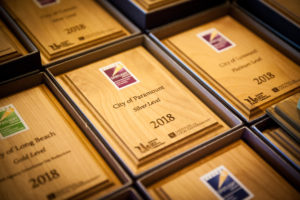
Paramount earns Silver-Level Sustainability Best Practices Beacon Spotlight Award
The City of Paramount was awarded the Silver-Level Sustainability Best Practices Beacon Spotlight Award at the League of California Cities Annual Conference and Expo on Thursday, September 13, 2018.
The Beacon Program provides a framework for local governments to share best practices that create healthier, more vibrant and sustainable communities. The program honors voluntary efforts by local governments to reduce greenhouse gas emissions, save energy and adopt policies that promote sustainability.
Due to decades of the City of Paramount’s diligent efforts to implement best practices outlined by the Institute of Local Government’s (ILG) Beacon program, the City has maintained its silver-level Sustainability Best Practices Beacon Spotlight Award.
In addition to honoring the individual achievements of local governments to save energy, reduce greenhouse gas emissions, and adopt sustainability practices, ILG’s Interim Executive Director Corrie Manning noted that ILG will be focusing on the bigger picture.
“We will also be highlighting how our cities have contributed to aggressive statewide goals to address climate change in California in a way that helps residents from all walks of life prosper and thrive,” Manning wrote.
The City’s most recent demonstrations of creating a healthier and sustainable community include partnering with Grid Alternatives to provide free solar to income-eligible residents, proposing zoning code amendments to prevent new uses of oil refineries, metal manufacturing and processing, plastics manufacturing, etc. and hosting a “clutter-free Paramount” event for residents to dispose of E-waste, large items, green waste, and documents.
Most recently, the City of Paramount has helped the environment by building an “eco-friendly” fleet of vehicles. Out of 108 total vehicles used by the City’s, 35 are gas/electric hybrids or run on compressed natural gas (CNG), with more to follow.
Over the years, the City’s sustainability projects have included:
Energy Efficiency & Conservation
- Upgraded all traffic signals to LED signal heads. Saves approximately $1,000 per year in energy costs per signal. (2001)
- When doing City facility upgrades, replaces lighting with LED. (2015)
Water & Wastewater Systems
- Wide-scale use of reclaimed water to irrigate most parks and many landscaped setbacks and traffic medians. (1992)
- Use a weather-based irrigation control system to regulate and improve the efficient irrigation of City facilities. (2008)
- Long-standing program of installing catch basin screens and inserts to prevent trash and other debris from entering rivers and oceans. (2008)
- Promotes water conservation and modified water use practices at City facilities. Installed water-saving devices and waterless urinals at many facilities. (2015)
Green Building
- Residents and businesses may participate in the Property Assessed Clean Energy Program (PACE), which allows them to obtain financing for energy and water efficiency products that can be repaid through annual property tax payments. (2010)
- Requires developers of new and significantly rebuilt facilities to install storm water management infrastructure to address and treat runoff. (2013)
- Adopted a “Green Street” ordinance that requires street resurfacing and reconstruction projects to incorporate ways to slow, filter, and cleanse storm water runoff from impervious surfaces (streets, sidewalks). Includes vegetation, soil, and engineered systems like permeable pavements. Green streets are designed to capture rainwater at its source where rain falls, rather than direct storm water runoff from impervious surfaces into storm sewer systems (gutters, drains, pipes) that dischrage directly into rivers and streams. (2013)
Water Reduction & Recycling
- Requires all contractors to recycle concrete and asphalt when doing resurfacing or concrete replacement work in the City. (2006)
- Via curbside recycling programs, reducing the number of pounds of waste produced per resident. (2007)
- Ongoing internal review of office practices to reduce impacts on the environment and reduce waste has led to employees replacing Styrofoam cups with reusable coffee cups and all departments working toward eliminating paper memos by using only emails. (2007)
- Partnered with contract tree trimmer, West Coast Arborists, for the Urban Wood Pathways program to recycle wood chips from City trees and to replant trees that are removed. (2016)
Climate-Friendly Purchasing
- Used rubberized asphalt in street resurfacing work. Approximately 4,000 old tires recycled per mile of each lane paved, and kept out of landfills. (10,000 were recycled in 2017 on Alondra Blvd.) (1989)
- When possible, purchases low- or zero-emission, hybrid, or alternative fuel vehicles for the City fleet; currently at 30% of total fleet with a goal of 50%. (1996)
Renewable Energy & Low Carbon Fuels
- Installed solar panels on roof of City Yard warehouse. (2010)
Efficient Transportation
- Applied for and received a grant to extend a dedicated bike path for further greenhouse gas reductions. (2017)
Land Use & Community Design - Developed a comprehensive Bike Master Plan that encourages greenhouse gas reductions. (2016)
Open Space & Offsetting Carbon Emissions
- Implementing focused tree planting program for neighborhood and parks. (1997)
- Participating in the Gateway Cities/COG Climate Action Plan. (2017)
- Joined Community Choice Aggregation program (Clean Power Alliance) to provide 50% cleaner, renewable, energy to residents and businesses reducing GHG impact to providing energy. (2017)
Community & Individual Action
- Started annual “Clutter-Free Paramount” event for residents to responsibly dispose of e-waste, large-items, green waste, and documents. (2018)
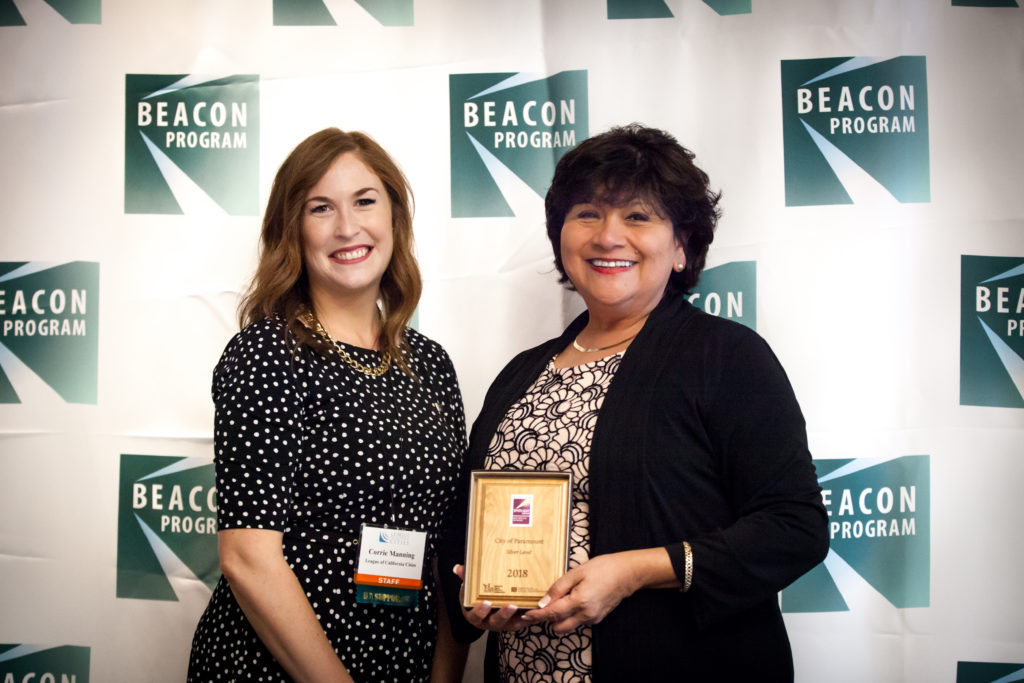
LOCC presents the Beacon Award to Mayor Diane Martinez
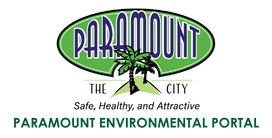
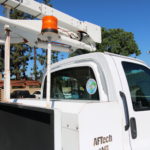
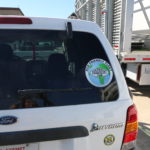
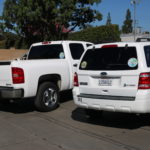
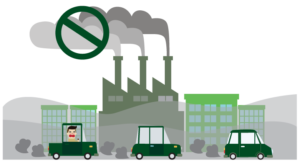
Comments are closed.